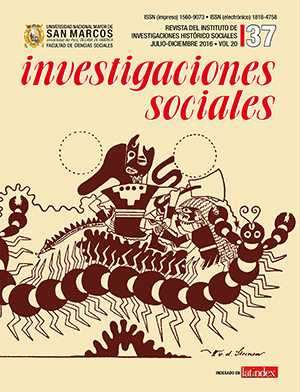Inequality, poverty and migration in the provinces of Lima and impact of centralism
DOI:
https://doi.org/10.15381/is.v20i37.13432Keywords:
Desigualdad, segregación, migración y centralismoAbstract
Inequality is one of the historical problems of the modern world, its regions and countries. The various forms and levels of inequality are showing how disturbed are the interdisciplinary discussions of current social development. From different perspectives inequality is addressed by UNDP, ECLAC in our region, OXFAM in their national, regional and global reports on inequality, wealth, poverty and the environment. The book “The Capital in the Twenty-First Century” by Thomas Piketty analyzes the historical inequality and proposes the estate tax, inclusive education and social security. For the Peruvian case there are different works on inequality from the Catholic University, University of the Pacific, IEP, among others. Inequality and poverty in Peru today is more present in the Andean and Amazonian rural areas, affecting ethnic and linguistic indigenous groups; also affects people of African descent and internal migrants on the urban area of the coast. The national centralism, focused mainly in Lima, presents a scenario characterized by territorial, population and income inequalities polarizing. These contrasts make the ethnic, social, racial and economic differences worse and limit democratic development allowing the continued existence of a social structure with low social mobility.Downloads
Published
Issue
Section
License
Copyright (c) 2017 Franklin Miranda Valdivia

This work is licensed under a Creative Commons Attribution-NonCommercial-ShareAlike 4.0 International License.
AUTHORS RETAIN THEIR RIGHTS:
a. Authors retain their trade mark rights and patent, and also on any process or procedure described in the article.
b. Authors retain their right to share, copy, distribute, perform and publicly communicate their article (eg, to place their article in an institutional repository or publish it in a book), with an acknowledgment of its initial publication in Investigaciones Sociales.
c. Authors retain theirs right to make a subsequent publication of their work, to use the article or any part thereof (eg a compilation of his papers, lecture notes, thesis, or a book), always indicating the source of publication (the originator of the work, journal, volume, number and date).






